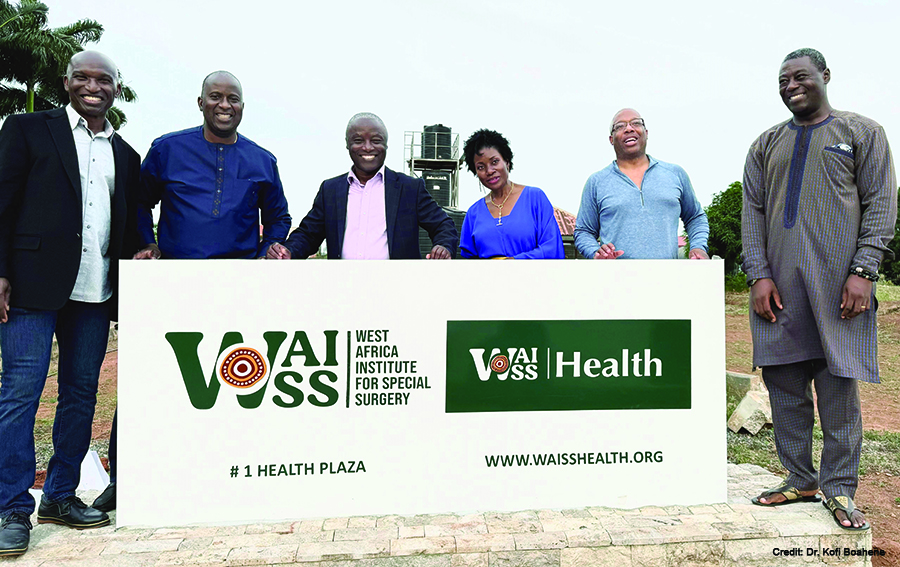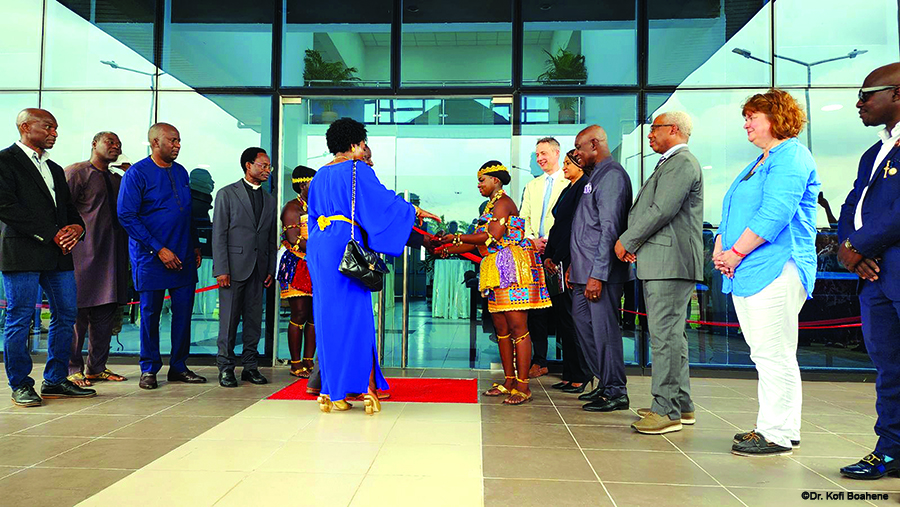The West Africa Institute for Special Surgery (WAISS) opened its doors in March 2024, marking a significant milestone in the effort to enhance medical care in Africa.
Explore This Issue
July 2024Shortly after its opening, the hospital received a call from an individual with kidney cancer—the “type of kidney cancer where, if they have the means, they get on a plane, fly to India, the U.S., or Germany, and get surgery,” said Kofi Boahene, MD, co-founder of WAISS, professor of otolaryngology–head and neck surgery and dermatology, and director of the division of facial plastics and reconstructive surgery at the Johns Hopkins University School of Medicine in Baltimore.
The afflicted individual asked, “Can you do this surgery?” The answer was yes. Specialty surgeons performed the complex, minimally invasive surgery at the new, 46-bed surgical hospital in Accra, Ghana, and the patient went home two days later.
It was an historic event. The successful surgery was the first one performed at WAISS and the first surgery of its kind completed in Ghana.

FSS Board members celebrate the opening of the West Africa Institute for Special Surgery (WAISS). From L to R: Dr. Joseph Akunnor, Dr. Ifepo Sofola, Dr. Kofi Boahene, Mrs. Pamela Sofola, Dr. Anthony Brissett, and Mr. Anthony Boateng.
“When people heard that the surgery was done, they didn’t believe it. They said, ‘Nobody does that surgery in this country,’” Dr. Boahene said. “But this is why we wanted to do what we have done. So, it is possible.”
According to a 2015 report by the Lancet Commission on Global Surgery, approximately five billion people do not have access to safe, affordable surgical and anesthesia care when needed (Lancet. 2015;386:569-624). Despite strides in recent years, access remains far below demand in many parts of the world. The Lancet Commission recommends 5,000 surgical procedures per 100,000 as a target to meet population surgical needs, but the current surgical volume rate in Ghana is just 869 surgical procedures per 100,000 population (Glob Health Action. 2022;15:2104301).
WAISS is the latest step in an ambitious plan born of the efforts of two otolaryngologists. Dr. Boahene and Ifepo Sofola, MD, a facial plastic surgeon in private practice in Washington, D.C., are determined to increase access to specialty surgery around the globe. To do so, they know they’ll have to increase local capacity, and to achieve that goal, they must build sophisticated hospitals and attract top-notch surgeons to train the next generation of healthcare providers. They’ve spent the better part of two decades working toward that goal and don’t plan to stop anytime soon.
African Roots
Drs. Boahene and Sofola met as fellows at a national academy meeting in the early 2000s. They couldn’t help but notice one another.
“Back then, there were not too many Africans or even African Americans in ENT, much less facial plastics,” said Dr. Sofola, who was born in the U.S. and grew up in Nigeria. He and Dr. Boahene, a native of Ghana, bonded over their shared heritage and similar experiences.
Flying into these various countries and performing surgery just wasn’t providing a lasting solution to the problems of subspecialty care on the continent.” —Ifepo Sofola, MD
The two men stayed in touch. Both had a deep desire to improve medical access in West Africa, and both participated, separately, in medical missions around the world. Eventually, they started doing medical missions together.
“I think the first mission I did with him was to Nigeria,” said Dr. Boahene. “And then we did missions to Rwanda.”
During these mission trips, they repaired complex facial defects with the help of other physicians and healthcare providers from the U.S. and Europe. They transformed patients’ lives but realized the need was far greater than periodic mission trips could meet.
“Flying into these various countries and performing surgery just wasn’t providing a lasting solution to the problems of subspecialty care on the continent,” Dr. Sofola said, noting that many sub-Saharan African nations lack robust infrastructure for healthcare. African doctors who want to pursue specialized training usually must leave and study elsewhere due to the “dearth of expertise on the continent,” he said. By the time they complete their training, many have families and are reluctant to uproot them to return to Africa.
“We were not making a sustainable impact,” Dr. Boahene said of their mission trips. “We always knew that at some point, to take that next leap, we needed a place where we could influence how local physicians are trained.”
The two men dreamed of eventually opening a hospital in Africa—a hospital that would also train local physicians to perform complex specialty surgeries and teach local healthcare providers how to manage the pre- and post-operative care of medically complex patients.
